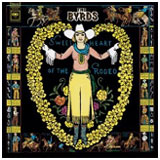Music |
The Byrds: Sweetheart of the Rodeo
By
Published: Mar 13, 2018
Category:
Country
600 of the 16,592 American servicemen killed in Vietnam in 1968 died that July.
Martin Luther King Jr. and Robert F. Kennedy were only recently murdered.
In late August, at the Democratic National Convention in Chicago, the police would riot and indiscriminately beat anyone who looked like a protestor.
On July 29, 1968, the Byrds released "Sweetheart of the Rodeo."
A country record at the height of a rock ‘n roll war?
It is hard to imagine crazier timing.
Even the record company was freaked. A radio ad for “Sweetheart” had a few seconds of a song from the album, followed by a fan saying, “Naw, that ain’t the Byrds."
But for one glorious moment it was indeed the Byrds, and if the album flopped in 1968, it’s hung around long enough to make #117 on Rolling Stone’s all-time top 500 list, influence everything that followed in the category of American Roots, and, not least, become the faithful companion of all who own it.
Quite a lot of Importance for a collection that included, nine cover versions of country/soul tunes. [To buy the CD from Amazon, click here. For the MP3 download, click here.]
What’s the fuss about?
Two things.
First was the arrow that “Sweetheart” pointed to the future. To the immediate future of Bob Dylan, for one, who would turn from rock to existential country in John Wesley Harding and outright country in Nashville Skyline. But even more, to a splintering of the “youth” audience from hard rock and psychedelia to other kinds of music.
And then there was the zepher of Gram Parsons. Before he showed up, the Byrds were in disarray — there were just two members. Parsons was a 21-year-old wunderkind with a passion for country. Roger McGuinn, the group’s leader, was sympathetic to country. It seemed Parsons would fit right in.
He did. And then he didn’t. He wrote the two original songs on the album and suggested some of the tunes that made it onto “Sweetheart”, but when it came time to tour, he balked at playing in South Africa. His vocals were re-recorded by McGuinn or mixed down. Parsons was relieved of duty; five years later, he overdosed and died.
So what’s it like? Organic. You’ll hear honky-tonk piano and steel guitar. You’ll hear how even a soul song has country roots and how the Southern side of Dylan is close to the surface. You’ll bask in the concerns of the simpler life found most easily in rural America. And you’ll be bathed in the kind of harmony that was the signature of the Bryds.
“Nothing is better/nothing is best/take care of your health/and get plenty of rest.”
Amen.


